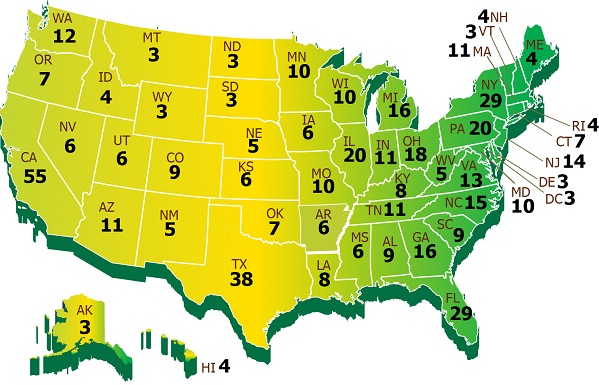lpetrich
Contributor
It's the Senate that was intended to be an elitist institution. Senators were originally appointed by state legislatures, but with the ratification of the 17th Amendment, they were elected by popular vote.
The Electoral College was a last-minute invention, and was intended to be an approximation of the popular vote.
The Founders were worried about the vote being dominated by regional favorites. In present-day terms, let us look at how some Presidential primaries would have turned out with that kind of vote.
Democrats 2020: New England: Bernie Sanders and Elizabeth Warren, New York City: Michael Bloomberg, Mid-Atlantic States: Joe BIden, Southern States: Beto O'Rourke, Great Lakes States: Pete Buttigieg, Great Plains States: Amy Klobuchar, Rocky Mountains States: John Hickenlooper, California: Kamala Harris, Pacific Northwest: Jay Inslee
Republicans 2016: Northeast: Ben Carson, New York City: Donald Trump, Mid-Atlantic States: Chris Christie, Florida: Marco Rubio, Texas: Ted Cruz, Southern States: Mike Huckabee
Originally, the electors were to vote for two candidates, with the one with the most votes becoming the President and the the one with the next most votes becoming the Vice President.
Donald Trump as Joe Biden's Vice President?
The first three elections worked something like that, but in 1800, the candidates ran as President-VP slates: Democratic-Republicans Thomas Jefferson & Aaron Burr vs. Federalists John Adams & Charles Cotesworth Pinckney with one Federalist voting for John Jay instead of CCP to help JA become elected.
This threw the election into the House, and that election was deadlocked for 35 votes before some Reps decided to cast blank votes and let Thomas Jefferson win.
This led to the 12th Amendment and the current procedure of voting separately for President and Vice President. But the candidates for those two offices still run together, as a ticket.
The Electoral College was a last-minute invention, and was intended to be an approximation of the popular vote.
The Founders were worried about the vote being dominated by regional favorites. In present-day terms, let us look at how some Presidential primaries would have turned out with that kind of vote.
Democrats 2020: New England: Bernie Sanders and Elizabeth Warren, New York City: Michael Bloomberg, Mid-Atlantic States: Joe BIden, Southern States: Beto O'Rourke, Great Lakes States: Pete Buttigieg, Great Plains States: Amy Klobuchar, Rocky Mountains States: John Hickenlooper, California: Kamala Harris, Pacific Northwest: Jay Inslee
Republicans 2016: Northeast: Ben Carson, New York City: Donald Trump, Mid-Atlantic States: Chris Christie, Florida: Marco Rubio, Texas: Ted Cruz, Southern States: Mike Huckabee
Originally, the electors were to vote for two candidates, with the one with the most votes becoming the President and the the one with the next most votes becoming the Vice President.
Donald Trump as Joe Biden's Vice President?
The first three elections worked something like that, but in 1800, the candidates ran as President-VP slates: Democratic-Republicans Thomas Jefferson & Aaron Burr vs. Federalists John Adams & Charles Cotesworth Pinckney with one Federalist voting for John Jay instead of CCP to help JA become elected.
This threw the election into the House, and that election was deadlocked for 35 votes before some Reps decided to cast blank votes and let Thomas Jefferson win.
This led to the 12th Amendment and the current procedure of voting separately for President and Vice President. But the candidates for those two offices still run together, as a ticket.


